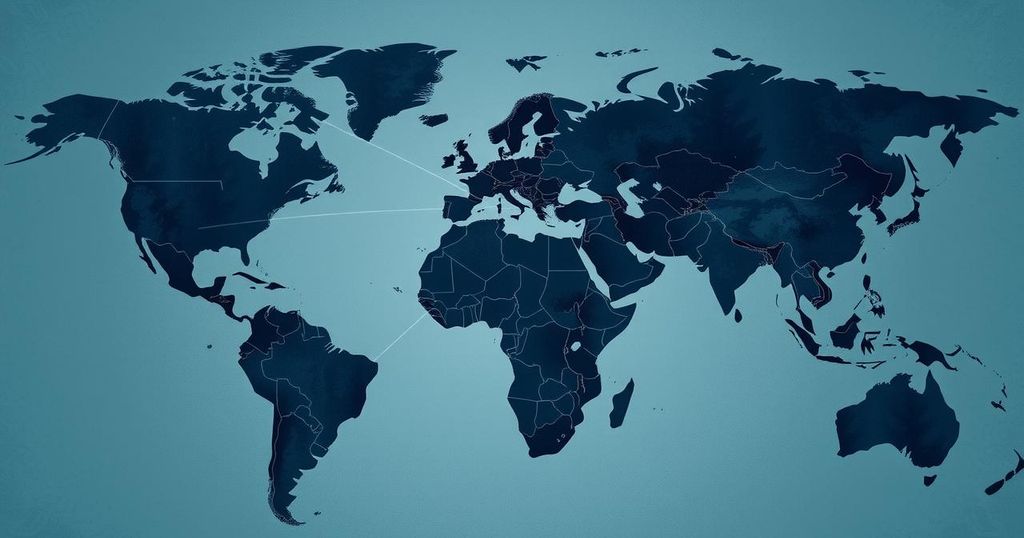Putin’s World Shrinks: Allies Walk Away as Ukraine Conflict Continues
- The war in Ukraine is eroding Russia’s alliances.
- Syria’s situation reflects Russia’s declining influence.
- Armenia’s exit from CSTO shows a shift in loyalty.
- Finland and Sweden’s NATO entry marks a significant change.
- Central Asia is moving away from traditional Russian ties.
The Fallout of Ukraine’s Ongoing Conflict on Russia’s Alliances
Moscow’s presence on the global stage is weakening as the war in Ukraine enters a prolonged phase, now stretching into its third year. It appears that the once-strong camaraderie shared with nations allied to the Kremlin is eroding. This conflict, which was supposed to bolster Russia’s military prowess, has instead resulted in a diplomatic downfall reminiscent of the United States’ experience in Afghanistan — a stark isolation that many did not expect. With each passing day, the echoes of friendship that once filled the halls of power seem to fade into silence, as countries slip away from what was once considered steadfast alliances.
Syria’s Decline: A Symbol of Russia’s Overextended Reach
Syria, which had previously symbolized a strategic victory for Vladimir Putin, has also revealed the cracks in Russia’s influence. In 2015, Russia’s intervention in the Syrian civil war was hailed as a turning point; support for Bashar al-Assad appeared solid. However, by 2024, as Russian forces remained preoccupied with the escalating conflict in Ukraine, Assad found himself vulnerable to renewed offensives from rebels. Russian forces could not extend their reach to protect their long-time ally, showcasing the limits of Moscow’s influence in what was seen as a guaranteed victory.
Armenia’s Shift Away from Moscow and the CSTO
Further complicating matters, Armenia’s relationship with Russia has also soured dramatically. Historically, Armenia relied heavily on Moscow for protection against Azerbaijan, but since the war in Ukraine intensified, Russia’s capacity to act has diminished. By 2023, as Nagorno-Karabakh fell and over 100,000 Armenians fled, the dissatisfaction towards Moscow’s role grew palpable, leading to a suspension of military agreements. The tragic culmination came when Armenia exited the CSTO, a security pact formed in 1997, signifying a profound shift in loyalty and allegiance away from Russia.
NATO’s Expansion: A Direct Response to Russian Actions
Meanwhile, the geopolitical landscape in Northern Europe has drastically shifted, as Finland and Sweden, once stalwarts of neutrality, have joined NATO in direct response to perceived Russian aggression. The war in Ukraine, counterintuitive to Putin’s intentions, has seen these Nordic countries redefine their security strategies in light of threats perceived from the East. The NATO alliance has now extended further into territory that Russia once considered its buffer, demonstrating a retreat from control that Moscow had attempted to reinforce years prior.
Central Asia’s Pivot Away from Russian Influence
In Central Asia, traditional ties that once linked these nations to Moscow are strained further. Countries like Kazakhstan and Uzbekistan, once under Moscow’s influence in terms of trade and culture, are now forging new paths by engaging with Europe, China, and Turkey. Reports are emerging of new infrastructure projects and trade routes being established, with Brussels, Ankara, and Beijing filling the void left by Russia, which is increasingly bogged down by its military commitments in Ukraine.
Iran’s Disillusionment: The Cost of One-Sided Loyalty
On another front, Iran’s loyalty to Russia appears to falter as well. Tehran provided support to Moscow in the form of drones used against Ukraine, but when faced with its own threats from Israeli airstrikes, Iran found Russia’s response inadequate. Despite recent cooperation, it appears that the partnership has become one-sided, leaving Iran under siege while Russia remains passively observant, illustrating how alliances can quickly unravel when mutual interests no longer align.
The Gradient of Isolation: A New Era for Russia
Across various regions, from Syria to Yerevan and beyond, the pattern of discontent and disengagement from Russia is unmistakable. The once-prominent figure of Moscow in global geopolitics is now characterized by isolation. The losses in alliances represent not merely a military struggle but an existential challenge to Russia’s standing. As alliances fray and new relationships emerge, it is clear that Russia’s world is shrinking, one former ally at a time.
A Notable Shift in Geopolitical Dynamics Post-Ukraine War
As the war in Ukraine continues, the collateral damage is not just the lives lost but the networks of alliances that have supported Russia’s global ambitions. Old friends have turned their backs, prompting a fundamental reckoning for the Kremlin about its role and strategy on the international stage. The transformation of partnerships signifies a dramatic shift that is reshaping the geopolitical landscape week by week, pointing towards a future where Russia may find itself increasingly alone in its endeavors.
In summary, the ongoing war in Ukraine has dramatically altered Russia’s diplomatic landscape, revealing fractures in alliances that once seemed unbreakable. Countries such as Syria and Armenia are distancing themselves, reflecting a broader trend that suggests growing dissatisfaction with Moscow’s limited support. As more nations engage with NATO out of concern and former allies explore new partnerships, Russia finds itself isolated, grappling with the repercussions of its actions in Ukraine and the ramifications they carry for its future on the world stage.




Post Comment